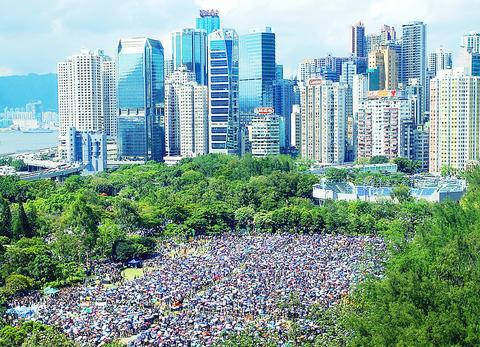Hundreds of thousands of protesters took to Hong Kong's streets yesterday to denounce the government's planned anti-subversion law, in the city's biggest street demonstration since the 1989 Tiananmen Square massacre.
"Return rule to the people," they chanted as the rally began to denounce a bill critics say will impose Beijing-style control over free speech and the media.

PHOTO: AP
Brandishing banners, umbrellas and fans, many wore black on a sweltering day to mourn what they said was the demise of rights and freedoms in one of the world's key financial centers.
Critics say the law, which Beijing has been pressing Hong Kong to enact, poses the biggest threat to basic rights in the former British colony since it reverted to Chinese rule in 1997.
Hours before the rally began, protesters burned the Communist Party flag as Chinese Premier Wen Jiabao (
By late afternoon rally organizers said around 400,000 people had turned out with more still pouring in. It was the largest organized protest in Hong Kong since 1989, when a million turned out after troops killed hundreds of pro-democracy demonstrators in the Chinese capital.
Many more protesters were stranded miles away as the crush of people heading to the rally overwhelmed subway and bus systems.
The government has said it would not back down on the legislation regardless of yesterday's turnout. The bill is bound to be passed by the territory's legislature, which is packed with pro-Beijing and pro-government supporters.
While most marchers' prime target was the anti-subversion measures, to be enshrined as Article 23 of Hong Kong's Basic Law or mini-constitution, many others said they were frustrated by the government's handling of the ailing economy and the SARS epidemic, which killed some 300 people in the territory.
Marchers came from all walks of life with businessmen, retirees and young couples pushing baby strollers marching alongside veteran pro-democracy supporters.

CHAOS: Iranians took to the streets playing celebratory music after reports of Khamenei’s death on Saturday, while mourners also gathered in Tehran yesterday Iranian Supreme Leader Ayatollah Ali Khamenei was killed in a major attack on Iran launched by Israel and the US, throwing the future of the Islamic republic into doubt and raising the risk of regional instability. Iranian state television and the state-run IRNA news agency announced the 86-year-old’s death early yesterday. US President Donald Trump said it gave Iranians their “greatest chance” to “take back” their country. The announcements came after a joint US and Israeli aerial bombardment that targeted Iranian military and governmental sites. Trump said the “heavy and pinpoint bombing” would continue through the week or as long

TRUST: The KMT said it respected the US’ timing and considerations, and hoped it would continue to honor its commitments to helping Taiwan bolster its defenses and deterrence US President Donald Trump is delaying a multibillion-dollar arms sale to Taiwan to ensure his visit to Beijing is successful, a New York Times report said. The weapons sales package has stalled in the US Department of State, the report said, citing US officials it did not identify. The White House has told agencies not to push forward ahead of Trump’s meeting with Chinese President Xi Jinping (習近平), it said. The two last month held a phone call to discuss trade and geopolitical flashpoints ahead of the summit. Xi raised the Taiwan issue and urged the US to handle arms sales to

BIG SPENDERS: Foreign investors bought the most Taiwan equities since 2005, signaling confidence that an AI boom would continue to benefit chipmakers Taiwan Semiconductor Manufacturing Co’s (TSMC, 台積電) market capitalization swelled to US$2 trillion for the first time following a 4.25 percent rally in its American depositary receipts (ADR) overnight, putting the world’s biggest contract chipmaker sixth on the list of the world’s biggest companies by market capitalization, just behind Amazon.com Inc. The site CompaniesMarketcap.com ranked TSMC ahead of Saudi Aramco and Meta Platforms Inc. The Taiwanese company’s ADRs on Tuesday surged to US$385.75 on the New York Stock Exchange, as strong demand for artificial intelligence (AI) applications led to chip supply constraints and boost revenue growth to record-breaking levels. Each TSMC ADR represents

State-run CPC Corp, Taiwan (CPC, 台灣中油) yesterday said that it had confirmed on Saturday night with its liquefied natural gas (LNG) and crude oil suppliers that shipments are proceeding as scheduled and that domestic supplies remain unaffected. The CPC yesterday announced the gasoline and diesel prices will rise by NT$0.2 and NT$0.4 per liter, respectively, starting Monday, citing Middle East tensions and blizzards in the eastern United States. CPC also iterated it has been reducing the proportion of crude oil imports from the Middle East and diversifying its supply sources in the past few years in response to geopolitical risks, expanding